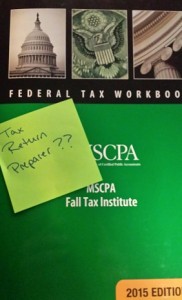This is the time that everybody is looking to get their returns filed, so I thought I would give you some suggestions for selecting a tax return preparer.
- Check the person’s qualifications — First check to see that they have a Preparer Tax Identification Number (PTIN). This is a number the IRS has assigned to preparers who are register to file returns. Also check to see if the preparer has a license that requires continuing education such as a CPA, Registered Agent, or do they belong to another organization that requires additional education each year. There are so many changes in tax law you want to be with a preparer that is going to put in the time to learn the changes.
- Check the preparer’s history — In some cases, you can find issues with the Better Business Bureau or through state board of accountancy. Another way to find out about an accountant is to ask several co-workers or friends.

- Ask how they charge for the preparation of a tax return — If the fees are based on a percentage of your refund you should avoid this situation. Also make sure the refund it going directly to you or your financial account.
- Make sure they offer electronic filing — If they are a preparer truly in the business of doing returns they will have to offer e-filing. Preparers who file more than 10 returns are required to electronically. If they are not filing more than 10 returns, they may lack the experience that you should look for in a preparer.
- Pay attention to how accessible the preparer is — Make sure the preparer is reachable not just during tax season but throughout the year for questions. You may also want to check if there are fees for follow up questions. Some preparers charge additional fees for meetings and calls through out the year.
- Provide all your records and receipts — While it is not the preparer’s responsibility to audit your summaries, the additional information can help them to determine if there are other questions they should be asking to avoid missing a deduction or taking a deduction that shouldn’t be allowed. Also in some cases the preparer keeps copies of the information used to prepare the return. This could prove to be useful if you were to need to substantiate anything on the return.
- Never sign a blank form — If you are presented with an e-file form or any form for that matter that has not been prepare do not sign it. Your signature means you are approving what is on that form.
- Review your return before signing it — Make sure you have an idea of what is on your return and as questions if there is something that doesn’t make sense. Most preparers are happy to go over your return page by page with you to explain what each is.
- Check the signatures — Make sure that before you sign the form, that the preparer has signed it and that their PTIN is on the return.
Lastly, something I’ve learned during my years of working with clients and preparing returns make sure you can talk to the preparer. They should not make you feel like you can’t talk to them or ask questions no matter how minor or major the question may. If you feel like that, then perhaps it would be good to find somebody that doesn’t make you feel that way. If you are comfortable talking with them and asking for help, you are going to have a much better experience and will be much happier with the results no matter what the out come of the return.
I get asked all kinds of questions throughout the year and try to do my best to ensure that my clients understand the situation and the answer. Tax preparation rules and regulations can be confusing, so I encourage people to keep asking questions until it is clear.
The Wassman CPA Services website and blog is meant to offer general information to our readers. The information provided is not intended to replace or serve as a substitute for any accounting, tax or other professional advice, consultation or service. You should contact Wassman CPA Services for advice concerning specific matters prior to making any decisions.
